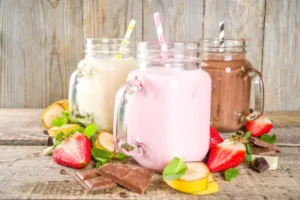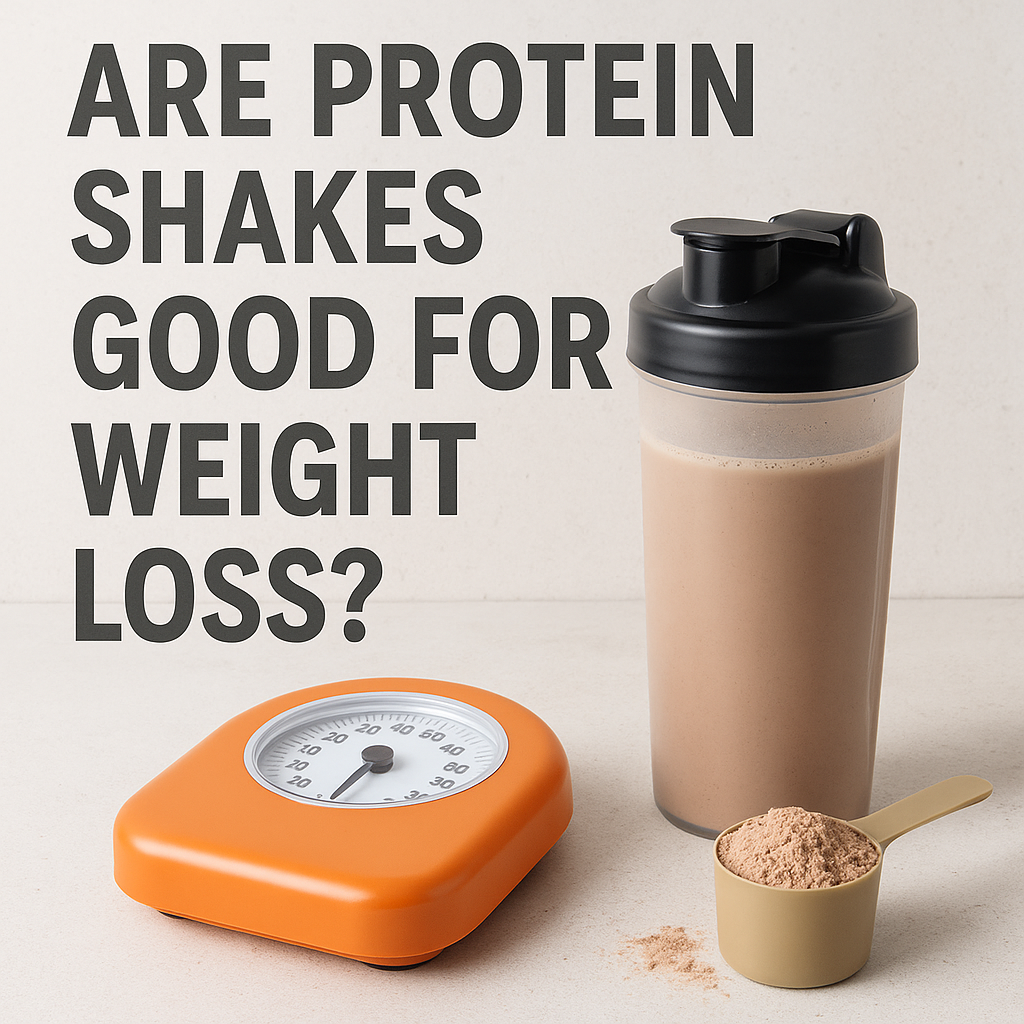Protein shakes are everywhere. Walk into any gym, grocery store, or health website, and you’ll find dozens of options promising muscle, energy, or fat loss. But here’s the big question: Are protein shakes good for weight loss?
The short answer: They can be—but only if you use them the right way. Let’s break it all down, from the science of how protein works to tips, mistakes to avoid, and what makes a good shake.
What Are Protein Shakes?
Protein shakes are beverages made by mixing protein powder with water, milk, or other liquids. They’re typically used as meal supplements or post-workout recovery tools.
Ingredients and Types
Most protein powders contain 15–30 grams of protein per serving and may include:
Sweeteners (natural or artificial)
Vitamins and minerals
Fiber
Fats and carbs (minimal in some cases)
Whey, Casein, Plant-Based, and Meal Replacements
Whey Protein: Fast-digesting, great for post-workout
Casein: Slow-digesting, better before bed
Plant-Based: Made from peas, rice, hemp—good for vegans
Meal Replacements: Include more carbs, fats, and micronutrients
How Protein Affects Weight Loss
Protein isn’t just about building muscle—it’s also a weight loss superhero. Here’s why:
Satiety and Hunger Control
Protein helps you feel full longer, which means fewer cravings and snacking.
Thermic Effect of Food (TEF)
Your body burns calories to digest food. Protein has the highest thermic effect—up to 30% of protein calories are burned during digestion.
Preserving Lean Muscle During Fat Loss
When you lose weight, you risk losing muscle too. Protein helps you keep that muscle, which keeps your metabolism higher.
Benefits of Protein Shakes for Weight Loss
Convenience and Time Saving
Busy morning? Running out the door? A protein shake takes less than 60 seconds to prepare.
Low-Calorie, High-Nutrient
Many shakes are under 200 calories but provide 20+ grams of protein and essential nutrients.
Easy Post-Workout Nutrition
Your muscles are like sponges after a workout. Protein shakes help them recover faster and stronger.
Best Time to Drink Protein Shakes for Weight Loss
Morning Boost
A shake in the morning can prevent mid-morning hunger and kickstart your metabolism.
Post-Workout Recovery
After exercise, your muscles need protein. A shake within 30 minutes helps repair and grow tissue.
Meal Replacement or Snack?
Shakes work as either:
Meal replacements (with added fats, fiber, and carbs)
Snacks (if you’re cutting calories but still need protein)

Protein Shake vs. Whole Food: Which Is Better?
When to Choose Shakes
Lack of time
Appetite issues
Need for quick post-workout fuel
When to Stick to Whole FoodS
You need more fiber or satiety
You prefer chewing (which helps with hunger)
You’re eating a balanced, sit-down meal
Common Mistakes to Avoid
Overeating Due to Liquid Calories
It’s easy to forget you’re drinking calories. Don’t add a shake on top of your regular meals unless you adjust your intake.
Choosing Sugar-Loaded Shakes
Some commercial shakes have 20+ grams of sugar. Always check labels and avoid those disguised as “healthy.”
Ignoring Overall Diet Quality
A shake won’t fix a bad diet. You still need fruits, veggies, and real meals.
How Much Protein Do You Need?
Based on Activity Level
Sedentary: 0.8g per kg of body weight
Active: 1.2–2.0g per kg
Weight loss: 1.6–2.4g per kg (to preserve muscle)
Based on Goals
Fat loss: Prioritize protein to preserve lean mass
Muscle gain: More protein, spaced throughout the day
Maintenance: Moderate protein with balanced macros
Are Protein Shakes Safe for Long-Term Use?
Ingredients to Watch Out For
Artificial sweeteners (like sucralose)
Fillers or preservatives
Heavy metals (check brands with third-party testing)
Potential Risks if Overused
Over-reliance can limit real food variety
Excess protein may strain the kidneys (in people with existing kidney issues)
Nutrient deficiencies occur if you replace all meals
Can You Lose Weight with Protein Shakes Alone?
Meal Replacements vs. Balanced Diet
Yes, you can lose weight drinking shakes only—but it’s not sustainable. Real foods offer fiber, variety, and better long-term satiety.
Why Lifestyle Still Matters
Weight loss is 80% nutrition, but movement, stress, and sleep also play big roles. Shakes should support, not replace, lifestyle changes.
The Role of Protein in a Calorie Deficit
How to Create a Deficit with Protein Shakes
Use shakes to lower calorie intake without losing nutrients:
Replace a high-calorie breakfast
Use as a snack instead of chips or pastries
Pairing with Exercise for Optimal Results
Strength training + high-protein intake = more fat loss and muscle retention.
Best Protein Powders for Weight Loss
Whey Isolate
Low in fat and carbs
Easily absorbed
Great for lactose-sensitive users
Pea and Brown Rice
Plant-based, hypoallergenic
Contains all essential amino acids
Collagen and Keto Protein Options
Collagen for skin, joints, and light protein support
Keto blends for low-carb diets
DIY Healthy Protein Shake Recipes
Low-Calorie Chocolate Shake
1 scoop chocolate whey
1 cup unsweetened almond milk
Ice, cinnamon, ½ banana
Green Protein Smoothie
ONE cup of spinach
1 tbsp chia seeds
1 cup water, ½ apple

Banana Coffee Protein Blend
1 scoop of protein
1 shot of espresso or instant coffee
½ frozen banana
Unsweetened almond milk
Real Transformations and Success Stories
What People Say About Using Shakes
Many users find that starting the day with a shake keeps them full and helps avoid junk food later.
Before-and-After Examples
“I lost 15 pounds by replacing my breakfast with a protein shake and walking 30 minutes daily.”
“Shakes helped me control portion sizes and finally stick to my calorie goal.”
Conclusion
So, are protein shakes good for weight loss? When used wisely. They offer convenience, satiety, and nutritional support, especially in a calorie-controlled plan. But they’re not magic. Pair them with healthy eating, movement, and a solid mindset, and you’ve got a powerful tool in your fat-loss toolbox.
FAQs
Can I drink protein shakes without working out?
Yes! While working out boosts results, protein still helps preserve muscle and reduce hunger on rest days.
How many protein shakes should I drink a day to lose weight?
1–2 shakes per day is typical, usually replacing meals or snacks. Don’t overdo it.
Are meal replacement shakes better than protein shakes for weight loss?
Meal replacements include more nutrients but also more calories. It depends on your goals.
Will protein shakes make me bulky?
No. Bulking up requires intense training and excess calories. Protein alone won’t do it.
Can I replace all meals with protein shakes?
Technically, yes, but it’s not recommended long-term. Variety is key for good health.

